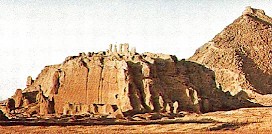Alexandria in Arachosia (Kandahar)
Q4720950Alexandria in Arachosia: town founded by Alexander the Great, modern Kandahar.

Alexandria in Arachosia was founded in the last weeks of the winter of 329 by Alexander the Great during his detour through southwestern Afghanistan during his campaign against Bessus. The city is identical to modern Kandahar, which still bears the ancient name (Alexandria >> Iskanderiya >> Kandahar).
The city appears to be identical to an older, Achaemenid town called Kapisakaniš. It was already an important city, because it was situated on the lower Helmond, source of great agricultural wealth. Trade added to this wealth: a traveler arriving from the west can go upstream along the Tarnak to modern Kabul, Gandara, and the Punjab, or to the southeast, across the Bolan pass to the lower Indus and Sattagydia.
During the troubles after king Cambyses in the summer of 522, Arachosia sided with the Persian pretender Vahyazdâta. But in Kapisakaniš, the legitimate satrap Vivâna stood his ground against Vahyazdâta's troops and secured the loyalty of the region to the new king Darius I the Great in two battles (29 December 522 and 21 February 521).
After this, the city disappears from history again, until Alexander refounded the city. After his death in 323, Kandahar was controled by several of his Successors, until in 303, Seleucus I Nicator gave it to Chandragupta Maurya as part of a bargain in which he received 500 elephants.
The city still belonged to the Mauryan Empire in 258 BCE, when Chandragupta's grandson Ashoka, who had converted to Buddhism, erected two of his rock edicts in the Arachosian city, one in Greek and one in Greek and Aramaic.
Ten years having been completed, King Piyadasi [=Ashoka] made piety known to men, and he caused men to be more pious afterwards and all things to flourish throughout the whole land; and the king practised abstinence from animate things, and also other men and all who were hunters or fishermen of the king have ceased hunting, and if there were some incontinent men they have ceased from their incontinence as much as possible, and they are obedient to their father and mother and the elders in contrast to before, and by doing these things they will live more profitably and better in every way in future.note
This proves that there was still a substantial Greek majority, and indeed, archaeologists have identified several inscriptions in Greek and coins.
Later, the town was captured by the Sacae, and Arachosia was renamed Sacastane, from which the modern name Sistan is derived. The Pustuns (or Parthans) appear to be their descendants. The city remained important during the Parthian, Kushan and Late Sasanian age, and had a substantial Buddhist minority. The Islamic conquest meant the end of Kandahar's prosperity.